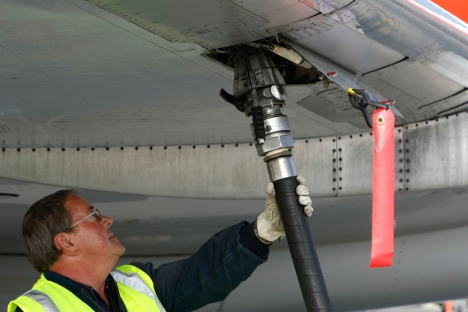
Combining gasification with fuel-cell technology could boost efficiency of coal-powered plants.

The small island nation is making an impressive renewables push to fight climate change.

A United States senator is seeking to pass legislation in California that would expose fossil fuel companies to investigations that could hold them accountable for purposely misleading the public over the scientific evidence for climate change.

U of T engineers are researching technologies like lightweight materials and flow control, which could potentially improve efficiency, lower costs and reduce emissions in the aviation industry

Going veggie can drastically reduce your carbon footprint. This is all at a personal level. What about when you multiply such changes by 7 billion people, and factor in a growing population?

A novel way to make plastic from carbon dioxide (CO2) and inedible plant material could provide a low-carbon alternative to plastic bottles.

Aviation is "a critical link in solving worldwide environmental challenges", says MIT professor.

China released its thirteenth five-year plan on Saturday, pledging to cut the carbon intensity of its economy to 18% below current levels by 2020, a target that is likely to guide the CO2 cap in its national emissions trading scheme.

Regulations that limit heavy metal pollution from oil- and coal-fired power plants will continue to be enforced by the EPA — at least for now — thanks to Supreme Court Chief Justice John Roberts.
Leonardo DiCaprio has won an Academy Award for best actor for his role as a betrayed 19th century frontiersman in The Revenant. The actor used his acceptance speech to warn about the effects of global warming, saying ‘Let us not take this planet for granted. I do not take this night for granted’

The global temperature rise must be kept below +2°C by the end of the century to avoid catastrophic climate change.

This week saw an important milestone for the aviation sector's ongoing efficiency drive with a technical, but important, new regulation taking shape at the specialised UN agency dealing with aviation, the International Civil Aviation Organization (ICAO).

The United States could reduce greenhouse gas emissions by almost 80 percent from 1990 levels, and do so as soon as 2030, without significantly increasing energy prices, claims a new study by researchers from NOAA and the University of Colorado.

As world leaders deliberate the best path to take towards a carbon free energy future, a remote national park on the banks of the Zambezi River in Zambia is leading the way in reducing its reliance on fossil fuels.

The world economy has a long way to go to break away from the use of coal and oil that fueled progress since the Industrial Revolution.